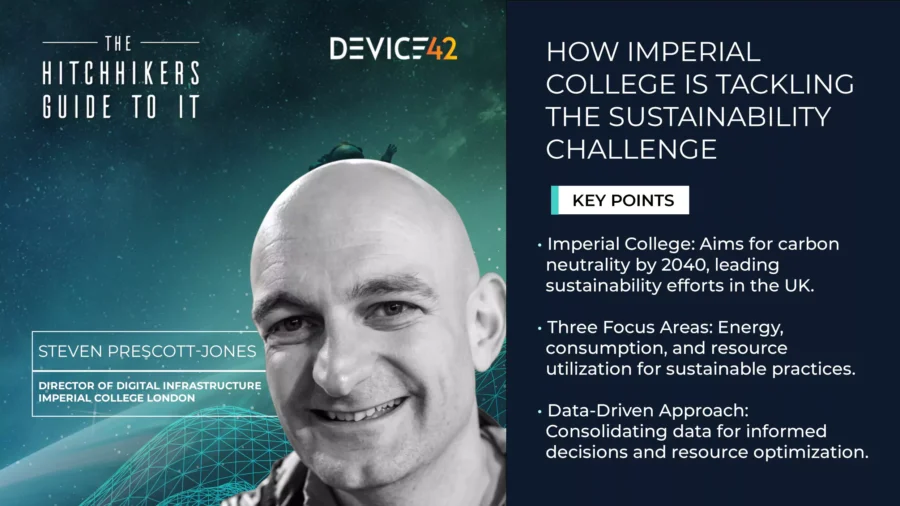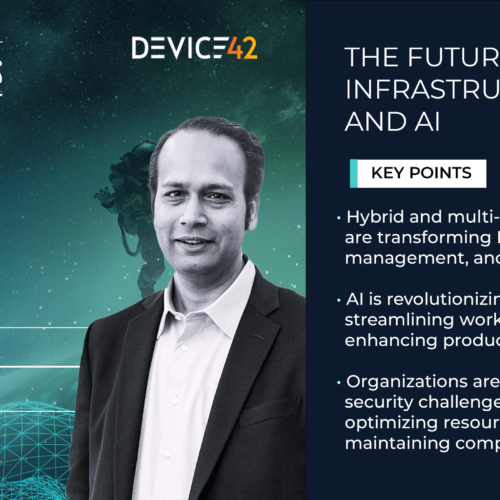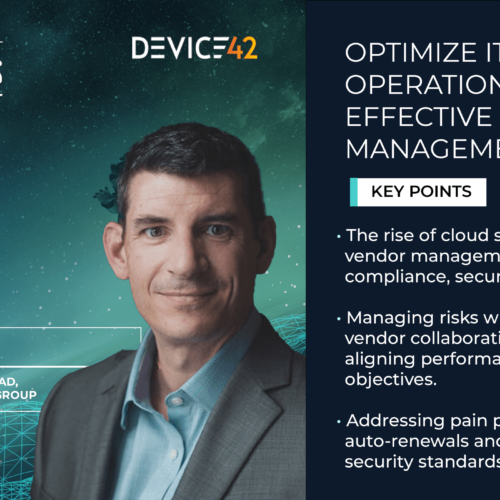As climate change impacts accelerate, many organizations are seeking to make faster progress with sustainability. IT, data, business, and sustainability teams can collaborate to set targets, leverage unified data to measure progress, and publicize results to inform key stakeholders. Sustainability leaders also gain valuable experience that they can share with others.
In the UK, nearly all (96%) of colleges and universities have developed a sustainability strategy and publish this information on their websites (97%). In addition, four in five (82%) report their progress to reduce carbon emissions: providing transparency and creating accountability around their efforts to drive sustainability progress forward.
Purpose of This Blog
The purpose of this blog is to encourage IT professionals to develop and evolve sustainability strategies and reporting that include Scope 3 emissions, typically the largest source of emissions for any organization.
Recently, podcast host Michelle Dawn Mooney welcomed Steven Prescott Jones to The Hitchhiker’s Guide to IT to discuss the Imperial College’s sustainability ambitions. Jones is the director of digital infrastructure for Imperial College in London. His prior IT experience includes overseeing mainframe technologies, identity management, technical architecture, IT solutions, and hybrid cloud infrastructure.
Host Mooney asked about Imperial College’s drive to become carbon-neutral by 2040.
Jones said that Imperial University seeks to gain experience with its sustainability program that it can offer to other organizations.
“We want to be at the forefront to provide the solutions and collaborations and the skills necessary to help the UK as a whole meet its targets, for net zero carbon emissions by 2050, and that’s why Imperial is aiming to be a step ahead of that,” he said.
Imperial College is measuring progress against reducing Scope 1 (direct), Scope 2 (indirect), and Scope 3 (supply chain) emissions, with a sustainability director setting strategy and coordinating programs across the college’s different campuses.
Read:
Improving the Sustainability of Information Technology
Sustainability Insights & Power Reduction
Increasing Data Center Energy Sustainability: Short- and Long-Term Strategies
Jones said the college’s buildings and classrooms are optimized for hybrid learning, enabling the college to improve space utilization and reduce power consumption.
One challenge Imperial College — and other universities face — is how to reduce energy use for high-performance computing that’s leveraged for cutting-edge research. To help solve that problem, Imperial College is developing carbon-neutral data centers that will be deployed at its new White City campus.
“So we’ll be at the forefront of ensuring that high-performance computers are as energy-efficient as possible, and consume as little power as possible, looking at water-cooled racks and those kinds of things to reduce that power consumption,” says Jones.
Jones and other leaders are also scrutinizing Scope 3 emissions, such as those created by its hyperscale partners. Jones said that third-party services constitute 80 percent of its current emissions footprint. “So that’s a really big challenge for us looking at what we consume and looking at how we can best utilize it,” he stated.
The Importance of Data in Setting Goals and Quantifying Progress
Mooney asked Jones to describe how Imperial College is using data to reach its goals.
Jones said that his team has created a unified data platform that includes emissions data, gathered from energy systems, building maintenance systems, and the team’s understanding of third-party carbon emissions.
“So everyone’s got a single source of truth for starting to work with that data, and we link that with inventory tooling and monitoring tooling, to try and start to pull together that picture of our energy consumption, of our building usage, of our cloud utilization,” he said.
With the ability to look building by building at consumption, the data, sustainability, and IT team can consider how different choices will impact the college’s footprint. The IT team is replacing the college’s Wi-Fi infrastructure to gain even more granular insights, such as room attendance. That will enable the college to match the right classroom sizes to classes, decreasing unnecessary power consumption. The Wi-Fi system will also automatically switch off lights, screens, and projectors in rooms that aren’t currently being used, reducing power usage further.
These and other decisions are part of a forthcoming roadmap that will “allow us to progress on getting our buildings in a position where they can help us achieve the net zero emissions that we’re aiming for,” said Jones.
How Organizations Can Succeed with Sustainability
Mooney asked Jones for his best strategies and tips for succeeding with sustainability. Jones said.
- Secure buy-in from key stakeholders: Senior leaders at Imperial College fully support the sustainability strategy and have provided funding for staff and technology.
- Commit to collaboration: Since Imperial College is a research university, the sustainability team also needs support from academicians, whose work could be impacted by new technology and processes. The team has socialized the college’s sustainability strategy and developed working groups on key topics, such as technology systems and building infrastructure, which have faculty representation.
Jones says this work is “a massive collaborative effort,” but influences stakeholders to make sustainable choices, such as the technology they use for research and whether they need to print key documents. - Leverage partnerships: Making progress against becoming carbon-neutral requires sustained investment and partnership. Imperial College relies on its partners, such as hyperscalers, to help it make progress.
Jones says he is inspired to do this work, knowing that it benefits not just his college but society as a whole.
To learn more about Imperial College’s sustainability program, please visit https://www.imperial.ac.uk/sustainable-imperial/




